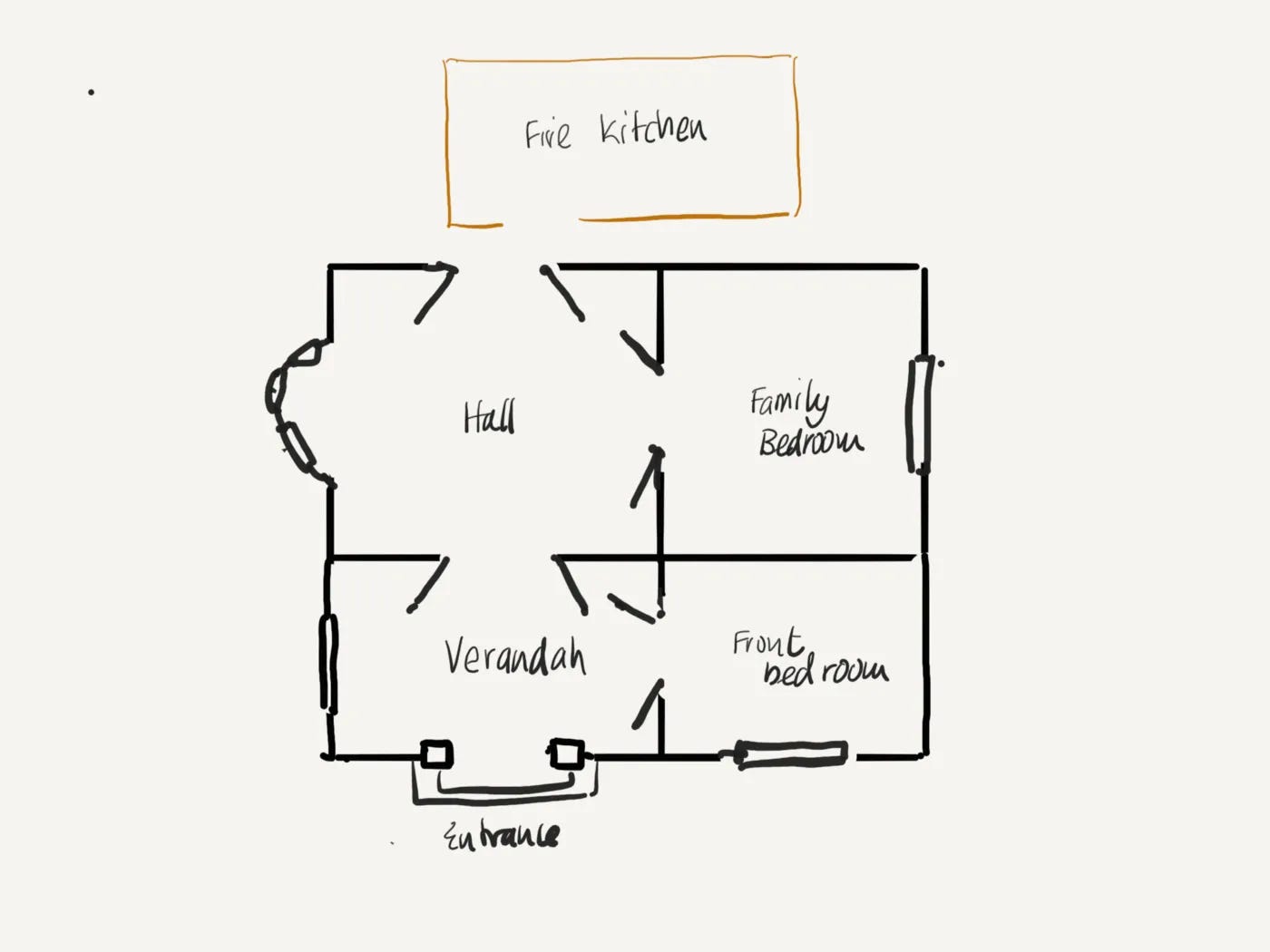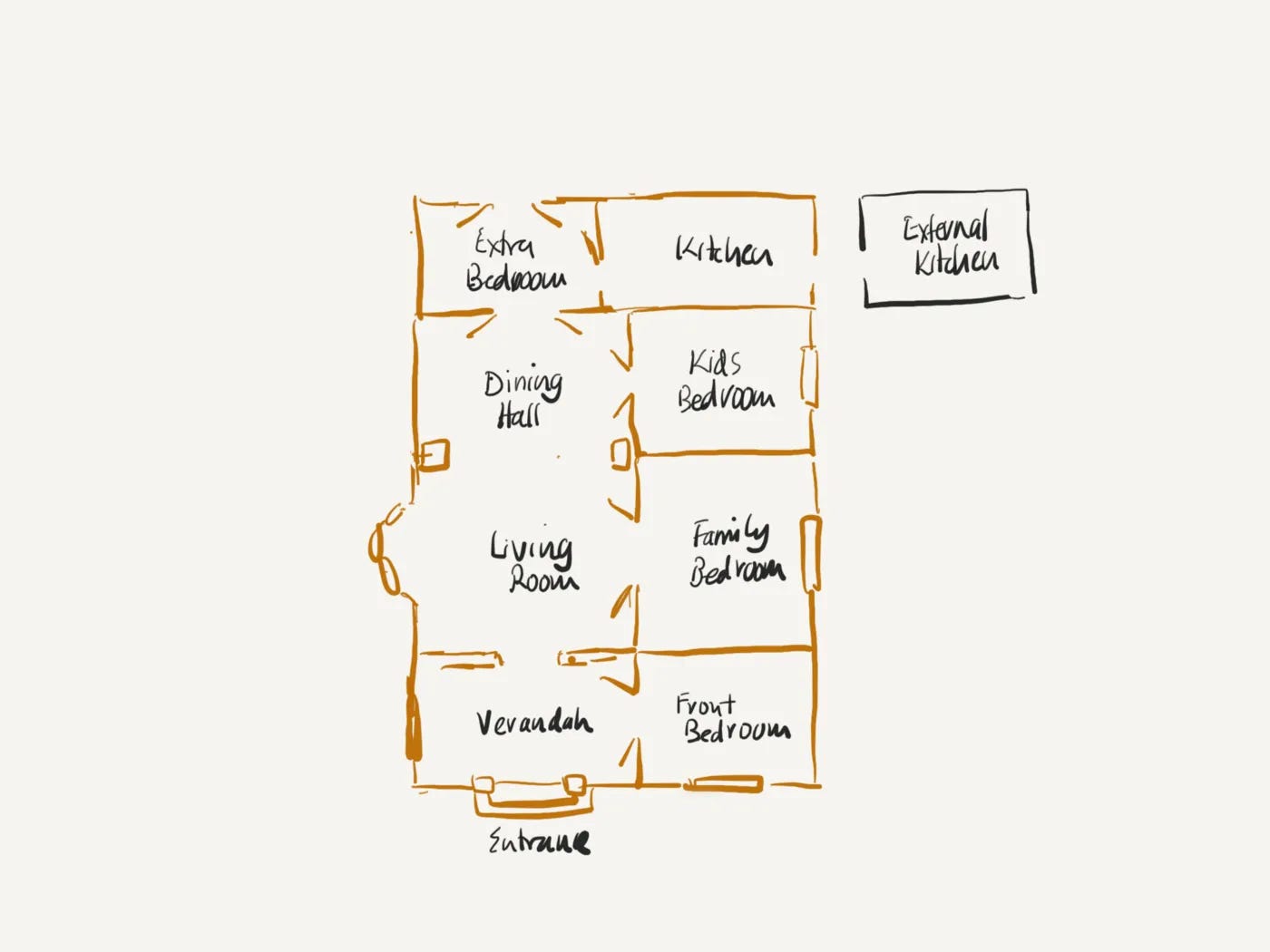The House That Grew
The House That Grew
Iwas six when the great transformation began. Like most momentous changes in childhood, it started quietly – with hushed conversations between my parents about rooms and walls and the future that seemed as distant as the hills beyond our garden.
Our house was a simple affair, built by my grandfather in the thirties when the world was a different place altogether. Two bedrooms, a living room, and that wonderful external kitchen where the firewood crackled and sent up spirals of smoke that I would watch from the garden. There was a toilet outside, and a well where we drew water that was always cool, even on the hottest days. The garden was enormous to my six-year-old eyes – a universe of possibilities.
But my parents, with their grown-up wisdom, saw what I could not: that we were outgrowing our little nest. My baby sister had arrived, and with her came the need for more space, more rooms, more life.
The plan was ambitious – four new areas would bloom from our modest home like flowers opening to the sun. A dining room, two bedrooms, and a modern kitchen that would make my mother’s eyes light up with joy. When complete, ours would be one of the grandest houses in the neighbourhood, though at six, I measured grandness not in square feet but in the number of hiding places it might offer.
Jeremias arrived to oversee the great work – my mother’s cousin, a man who understood both houses and hearts. With him came his assistants: Publis, Joseph, and young Michael, all family, all part of the intricate web of relationships that made our world feel safe and complete. This would be no ordinary construction project; it would be a family symphony.
The transformation of our front yard was magical. One morning it was simply where I played with my wooden toys, and by evening it had become something else entirely – a landscape of possibilities. Bags of cement arrived like mysterious visitors, bricks were stacked in neat pyramids, river sand made small dunes, and wooden planks lay about like sleeping giants.
The four men worked with a rhythm that was beautiful to watch. Dressed in short sarongs, their bodies brown from the sun, they moved with the grace of dancers. They mixed cement and sand with water drawn from our faithful well, carried bricks as if they weighed nothing at all, and built walls that rose like hopes made manifest. It was honest work, the kind that leaves a man tired but satisfied when the sun sets.
At noon, my mother would appear with lunch, and the men would gather in whatever shade they could find. Between the serious business of construction, there was always time for tea, and I, being six and eager to be useful, would help in my small way.
These men were not strangers – they were my uncles, my ‘mamas,’ and I was their ‘putha.’ Michael mama, Publis mama, Joseph mama – each name carried the weight of belonging. Among them, I felt the particular freedom that comes from being with family, where love doesn’t need to be earned because it simply is.
The construction site became my new kingdom. In those days, before machines ruled the world, everything was done by hand with simple tools that seemed like extensions of the men who wielded them. Chisels and saws, hammers and measuring tapes – each had its purpose, its own particular song when put to use. Under the watchful eyes of my uncles, I was free to explore this fascinating new world of creation.
Every afternoon, when school released me back into my real life, I would race home, change clothes, and join my uncles at their work. The three elder men were artists in their own way – bricklayers who thought in straight lines, carpenters who understood the language of wood, craftsmen who could make windows and doors appear as if by magic. They climbed to the roof on a ladder made of bamboo, as natural as birds finding their perches. Young Michael was learning from his elders, absorbing their wisdom the way the earth absorbs rain.
Evenings were the best time. After the day’s labour, my uncles would bathe at our well, and I would sit nearby, chattering about everything and nothing while they washed away the day’s honest sweat. Then they would change into their going-home clothes and make the journey back to their village, ten kilometres away, where my mother’s family roots ran deep.
Weekends brought special joy. Francis and Agnes, the youngest of the family, would arrive with their brothers. Suddenly I had playmates who understood the magic of construction debris. We built miniature houses from wood scraps, created elaborate roadways for my toy cars on discarded planks, and constructed sandcastles that were surely the finest architecture our front yard had ever seen.
Sometimes Kudamma, their mother, would come too. She was one of those rare people who carried happiness like a perfume – wherever she went, the air seemed lighter. When she arrived, she would take over our kitchen with the confidence of someone who knew that food was love made visible. Her jackfruit dishes and red fish curries were legendary, and her smile was the kind that made you believe the world was fundamentally good.
Four months passed like pages in a favourite book – each day bringing something new, each small completion a cause for celebration. Finally, the men applied the last coat of slaked lime to the freshly plastered walls. The floors, mixed with red oxide, gleamed like rubies. The whole house exhaled a fresh, clean scent that spoke of new beginnings.
Our humble home had transformed into something magnificent. Four new rooms stretched from the back like wings, doubling our space and our possibilities. A grand door with four panels now graced the front veranda, and an arch in the large hall added elegance that would have made my grandfather proud.
My father ordered new furniture to fill the expanded spaces, while my mother sewed curtains that would frame our windows like poetry. She hung pictures of Jesus and Mary, blessing our transformed home and dedicating it to the divine. In the new integrated kitchen, my mother and Kadayamma, my grandmother, moved with the satisfaction of women whose domestic dreams had finally found their proper stage.
When it was finished, when the last nail was driven and the final touch of paint applied, I stood in my new bedroom – the one I would share with my grandmother – and felt something I could not yet name. It was more than happiness, more than satisfaction. It was the deep contentment that comes from watching love take physical form, from seeing how hands and hearts working together can transform not just houses, but the very meaning of home.
It was, simply and completely, bliss.


Photo 1: Before the Renovations
A modest old house with peeling limewash, shaded by mango trees. The outdoor kitchen and separate well whisper of a simpler time — where every corner held a memory.
Photo 2: The Workers — Denzil’s Uncles
Jeremias, Publis, Joseph, and Michael — shirtless under the sun, their hands dusty with cement. Family first, builders second. Their laughter mixed with the rhythm of hammers and saws.

Photo 3: After the Renovations
A fresh coat of paint, gleaming red cement floors, elegant archways and a wide new veranda. A home reborn — with new rooms, new light, and the same old heart.
Comments
Post a Comment